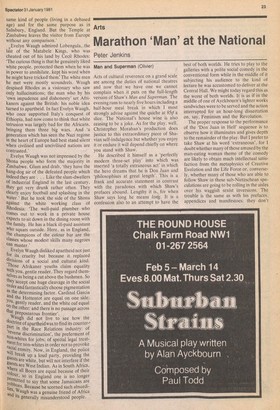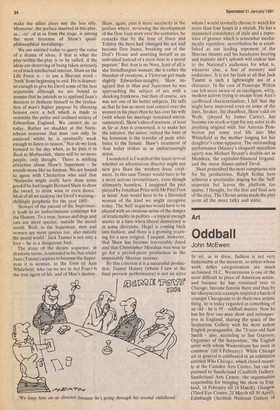Arts
Marathon 'Man' at the National
Peter Jenkins
Man and Superman (Olivier) Acts of cultural reverence on a grand scale are among the duties of national theatres and now that we have one we cannot complain when it puts on the full-length version of Shaw's Man and Superman. The evening runs to nearly five hours including a half-hour meal break in which I most • strongly advise against the quiche at 8513 a slice. The National's house wine is also ceasing to be a joke. As for the play, well, Christopher Morahan's production does justice to this extraordinary piece of Shavian self-indulgence but whether you enjoy it or endure it will depend chiefly on where you stand with Shaw.
He described it himself as a 'perfectly modern three-set play' into which was inserted `a totally extraneous act' in which the hero dreams that he is Don Juan and 'philosophises at great length'. This is a frank and accurate statement in contrast with the paradoxes with which Shaw's prefaces abound. Lengthy it is, for when Shaw says long he means lo4. It is a confession also to an attempt to have the best of both worlds. He tries to play to the galleries with a polite social comedy in the conventional form while in the middle of it subjecting his audience to the kind of lecture he was accustomed to deliver at the Central Hall. We might today regard this as the worst of both worlds, It is as if in the middle of one of Ayckbourn's lighter works sandwiches were to be served and the action interrupted for an hour-long dissertation on, say, Feminism and the Revolution.
The proper response to the performance of the `Don Juan in Hell' sequence is to observe how it illuminates and gives depth to the remainder of the play. But I prefer to take Shaw at his word 'extraneous', for I doubt whether many of those amused by the man-eating woman theme of the comedy are likely to obtain much intellectual satisfaction from the metaphysics of Creative Evolution and the Life Force or, conversely, whether many of those who are able to follow Shaw in these sub-Nietzschean speculations are going to be rolling in the aisles over his waggish sexist inversions. The trouble is the same as with his prefaces, appendices and manifestoes: they don't make the sillier plays any the less silly. Moreover, the preface inserted in this play, al.:. ect at us from the stage, is among the most tiresome of Shaw's quasiphilosophical moralisings.
We are entitled today to query the value of a drama of ideas, if that is what the play-within-the-play is to be called, if the ideas are deserving of being taken seriously or of much intellectual interest. Shaw on the Life Force is to use a Shavian word 'bosh' from beginning to end. He is dramatist enough to give his Devil some of the best arguments although we are bound to assume that he intends us to applaud Juan's decision to dedicate himself to the realisation of man's higher purpose by choosing heaven over a hell which is made to resemble the polite and civilised society of Edwardian England. We cannot do so today. Rather we shudder at the Nietzschean nonsense that man 'can only be enslaved whilst he is spiritually weak enough to listen to reason.' Nor do we look forward to the day when, as he puts it in Back to Methuselah, 'there will be no more people, only thought.' There is nothing attractive about Shaw's Superman he sounds more like an Iceman. We are bound to agree with Chesterton who said that 'Nietzsche might really have done some good if he had taught Bernard Shaw to draw the sword, to drink wine or even dance.' Most of all we endorse the Devil's warningchillingly prophetic for the year 1905: 'Beware of the pursuit of the Superman; it leads to an indiscriminate contempt for the Human. To a man, horses and dogs and cats are mere species, outside the moral world. Well, to the Superman, men and women are mere species too, also outside the moral world.' Jack Tanner is not only a fool he is a dangerous fool.
The irony of the dream sequence, in dramatic terms, is intended to be that whilst Juan (Tanner) aspires to become the Superman it is woman, in the form of Ann Whitefield, who (as we see in Act Four) is the true agent of his, and of Man's destiny. Shaw, again, puts it more succinctly in the preface where, reviewing the development of the Don Juan story over the centuries, he remarks that by the time of Ibsen and Tolstoy the hero had `changed his sex and become Don Juana, breaking out of the Doll's House and asserting herself as an individual instead of a mere item in a moral pageant.' But Ann is no Nora, least of all is she Strindbergian woman; she is rather the blandest of creations, a Victorian girl made slightly Edwardian-naughty. Shaw imagined that in Man and Superman he was approaching the subject of sex with a shocking frankness, but then of course, sex was not one of his better subjects. He tells us that he has no more real control over the women in his plays than he has over his wife (with whom his marriage remained unconsummated). Shaw's idea of sexiness, at least as far as Ann is concerned, is to make her the initiator, the suitor; indeed the limit of his feminism is the transfer of male attributes to the female. Shaw's treatment of Ann today strikes us as embarrassingly sexist.
I wondered as I watched this latest revival whether an adventurous director might not now give Shaw the 'modern dress' treatment. In this case Tanner would have to be 'a more serious revolutionary, even though ultimately harmless. I imagined the part played by Jonathan Price with Mr Paul Foot in mind. Ann would have to be a liberated woman of the kind we might recognise today. The `hell' sequence would have to be . played with an ominous sense of the danger of irrationality in politics a topical enough matter at a time when liberal democracy is in some disrepute, Hegel is coming back into fashion, and there is a growing yearning for a new religion. I suspect, however, 'that Shaw has become irrevocably dated and that Christopher Morahan was wise to go for a period-piece production in the impeccably Shavian manner.
By this criterion it is a successful production. Daniel Massey (whom I saw at the final preview performance) is not an actor whom I would normally choose to watch for more than four hours at a stretch. He has a mannered consistency of style and a repertoire of gesture which is somewhat mechanically repetitive; nevertheless he is established as our leading exponent of the Shavian theatre and his handsome hearing and matinee idol's aplomb will endear him to the National's audiences for what is, whatever else, a feat of memory and endurance. It is not his fault at all that Jack Tanner is such a lightweight ass of a character. In the case of Penelope Wilton one felt more aware of an intelligent, witty, modern actress trying to escape from Ann's cardboard characterisation; I felt that she might have improved even on some of the lines. Straker, the chauffeur, Shaw's skit on Wells, (played by James Carter), has become too stock-a-type for any actor to do anything original with, but Antonia Pemberton put some real life into Mrs Whitefield as the mother longing for her daughter's come-uppance. The outstanding performance (Massey's eloquent marathon apart) was Michael Bryant's double-act as Mendoza, the capitalist-financed brigand, and the suave dinner-suited Devil.
Shaw prescribed the most sumptuous sets for his productions, Ralph Koltai here 'achieves a spectacular staging for the `hell' sequence but leaves the platform too sparse, I thought, for the first and final acts of the play. The Olivier arena made the play seem all the more talky and static.







































 Previous page
Previous page